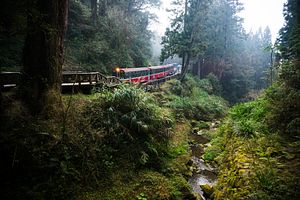On May 6, representatives of Taiwan’s Alishan Forestry Railway and Switzerland’s Matterhorn Gotthard Railway signed a “sister-railway” agreement in Taipei. Aimed at boosting technical cooperation and sharing marketing expertise between the two mountain railways, such an agreement would normally pass by unremarked outside railway circles and the local tourism industry. Indeed, the Alishan railway already has two such agreements with similar railway lines in Japan. But this agreement was not signed in Chiayi, headquarters of the Alishan railway, or in Switzerland, but in central Taipei, in the presence no less of Taiwan’s outgoing Premier Chang San-cheng and the vice minister of foreign affairs. Why such high-level interest?
One explanation can be found at Chushan station, the highest point on the Alishan line and where hundreds of thousands of tourists come each year to watch the sunrise over Yushan. Until China completed its railway to Tibet earlier this century, this was the highest railway station in Asia and a board on the platform compares the Alishan line with other mountain railways around the world. As an engineering marvel, the Alishan line stands in comparison with the most famous of them. Built in the early years of the twentieth century when Japan governed Taiwan, it features some of the steepest gradients on a traditional railway line anywhere in the world. The complex triple spiral at Dulishan, by which the railway gains hundreds of meters in altitude through a series of tunnels, the final one completing a figure eight inside the mountain, is a monument to early engineering skills and standards, equaling if not surpassing similar marvels in Switzerland.
But every other railway line listed on the board at Chushan has something the Alishan line lacks: UNESCO World Heritage status. The Taiwanese would love to see Alishan gain that too; they are justifiably proud of the line and it has iconic status on the island. But nomination to the World Heritage list can only be done by State Parties that adhere to the World Heritage Convention and therein lies the problem. For Taiwan is not an adherent to the convention and Chinese opposition means it is unlikely to become one any time soon. To China, anything that might imply statehood or independent status for Taiwan is unacceptable, even matters of cultural heritage. UNESCO’s bureaucrats would doubtless argue that China could nominate the railway for World Heritage status if it so wished, but in Taiwanese eyes that would be like the United Kingdom nominating a site in Ireland for protection.
For the last eight years there has been an uneasy truce between the two sides of the Taiwan Strait over international recognition, with each side willing to accept the status quo. But the election in January of Tsai Ing-wen as the next president of Taiwan may have put an end to that. Already in March China opened an embassy in The Gambia after the latter switched its diplomatic recognition and Taiwan is still waiting for its usual letter of invitation to attend the annual meeting of the World Health Assembly (the widespread assumption is that China is blocking it).
There are fears in Taiwan that such moves may only be the start and that after Tsai’s inauguration on May 20, China will take further steps to increase Taiwan’s international isolation. Such moves would be badly received anywhere, but especially in Taiwan – an outward-looking, trade dependent economy that thrives on its international connections. Hence the significance of any international agreement, even one to promote railway cooperation.
Large sections of the Alishan line are periodically destroyed by earthquakes and typhoons. In most other countries, governments would long ago have given up the struggle to keep it open and replaced it by a cheaper alternative. Only national determination to preserve it keeps it running against the odds. Similar determination means Taiwan will never give up its battle for recognition, however long it may take and unequal the odds.
Michael Reilly is a Visiting Fellow in the Institute for European and American Studies at Academia Sinica in Taiwan and a Senior Fellow of the China Policy Institute at Nottingham University in the U.K. A British diplomat for more than 30 years, he spent much of his career in East Asia, culminating as Director of the British Office in Taipei from 2005-2009.

































